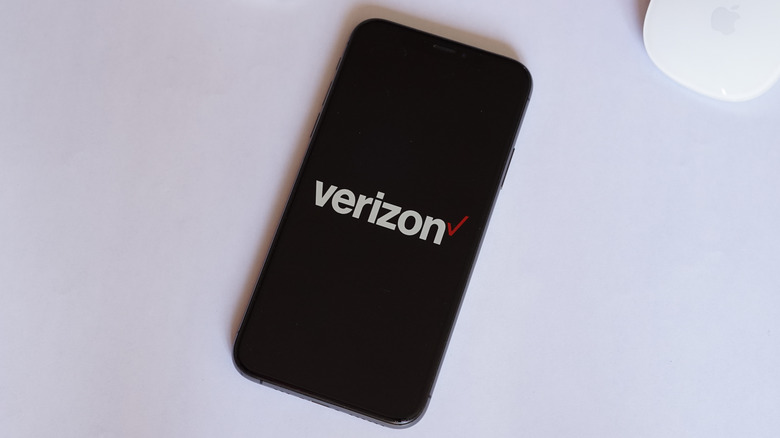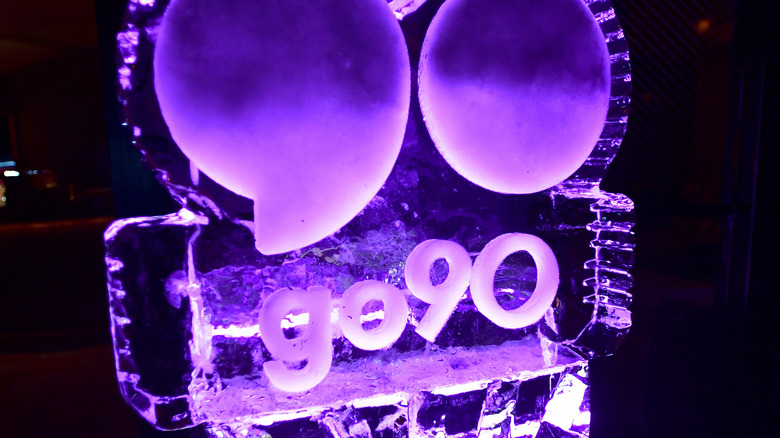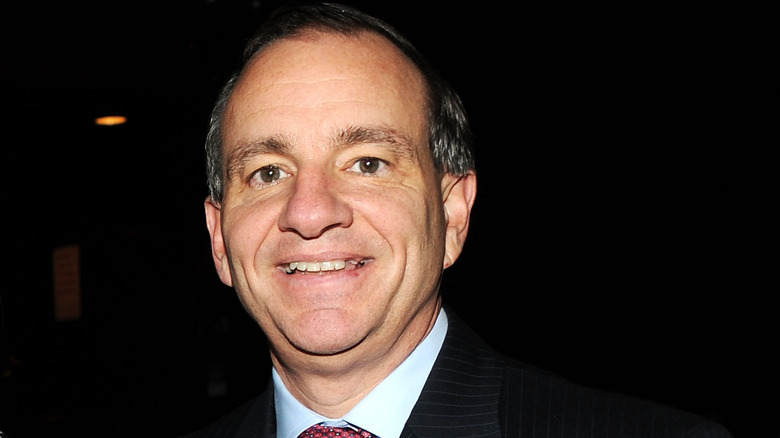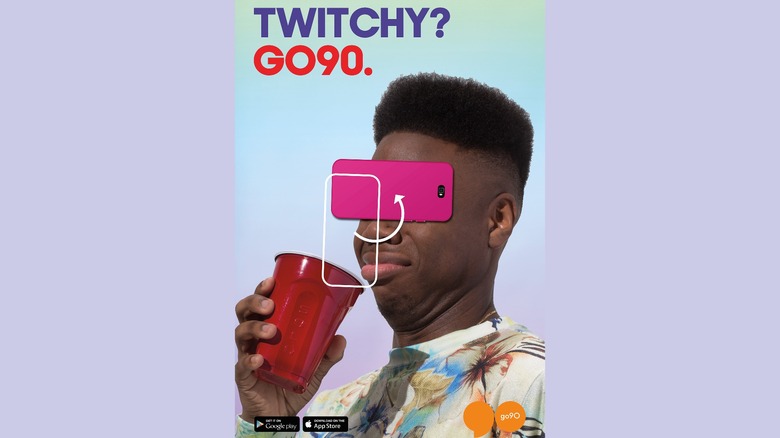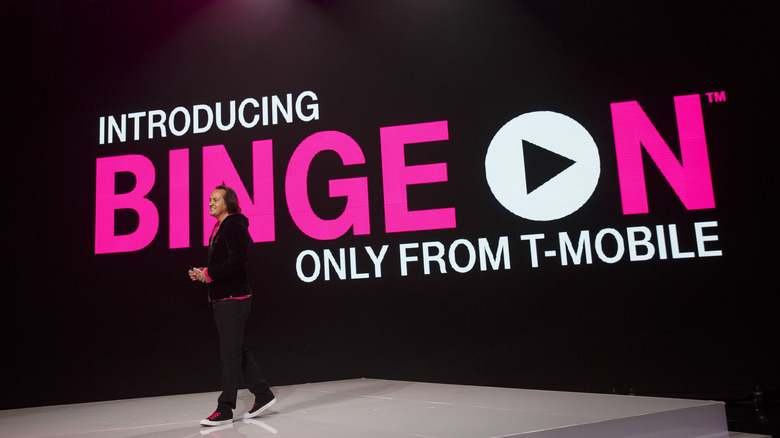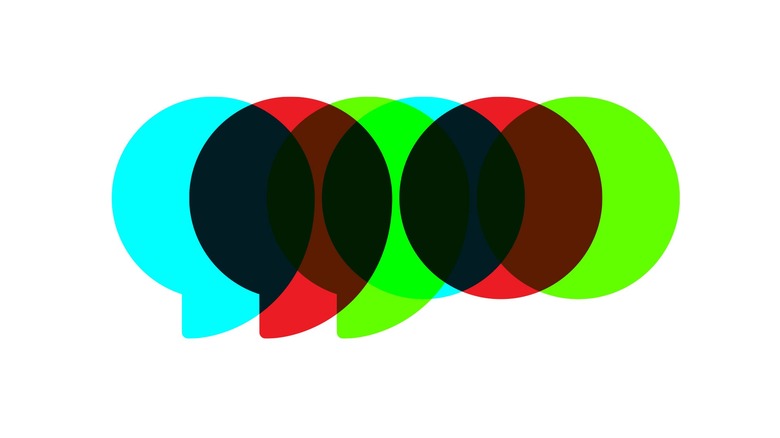Why Go90 Was One Of Verizon's Biggest Flops
These days, Verizon is primarily known for its Verizon Wireless and Verizon Fios brands, where the company provides arguable best-in-class service when it comes to mobile phone and home broadband service, respectively. It's the core competency of the former Bell Atlantic, after all. Back in 2015, though, Verizon dipped its toes into a new venture: go90, a free, ad-supported video streaming app for iOS and Android. Though it had some cool features, like the ability to clip small portions of shows to send to your friends, the app was a massive flop that was folded in under three years.
With a mix of licensed content and short-form original programming, go90 just never found its audience. This didn't come out of the blue, though. Shortly before the launch of the service, John Legere, the colorful CEO of wireless rival T-Mobile, remarked at a Goldman Sachs conference that "I do think this Go90 could be the biggest debacle," comparing it to then-recent failures like the Amazon Fire Phone. So what happened, exactly, and how much of it was foreseeable?
How did the tech industry view go90?
The name "go90" was intended as a nod to the service's mobile-first mission, with the idea that viewers would need to rotate their phone 90 degrees for the optimal mobile viewing experience. This also meant that the service was primarily targeting younger consumers, those more likely to watch videos on their phones and tablets than on TVs or even computers. Even at launch, though, it was clear that not everyone thought it was the right play, particularly among Verizon's competitors. Not only did T-Mobile's John Legere shade go90 as a potential "debacle," but broadband rival Comcast was launching a similar service, Watchable, that took the same basic idea but made it available on other platforms, like web browsers and set-top boxes.
(Legere didn't leave his go90 shade at the Goldman Sachs conference, either, saying on a T-Mobile investors call that the service's potential was a mystery because "I'm not sure if you interviewed 10 young millennials in Times Square as to how panting they are for Go90, or whatever the item is, that is coming from Verizon in the future.")
Perhaps more critically, analysts felt that Verizon (and Comcast as well) may have been missing the point of how Zoomers and younger millennials consume video content. "Generally, I'm not very bullish on the approach," nScreenMedia co-founder and chief analyst Colin Dixon told Multichannel News at launch. "I don't think the millennials they are targeting are looking for a curated experience." He added that while go90 had interesting content to offer and a good interface, the interface alone couldn't draw new eyeballs to the app. Overall, he felt that go90's most likely route to success was if Verizon could extend their exclusive mobile NFL streaming rights to the then-new service.
How did Verizon view go90?
Shortly after the October 1, 2015 launch, Verizon executives spoke extensively about how they were positioning go90. "The environment is, millennials don't want linear-TV content," Verizon CFO Fran Shammo said on the company's Q3 2015 investor call just a few weeks after the go90 launch. Later on the call, he added that "[t]hey are disconnecting their cable for just internet content and mobile content, and that goes to why we are launching go90 with the mobile-first perspective, and that's attacking that entire segment that the Fios brand does not attack today through our linear-TV product."
Earlier that month, in an interview with Broadcasting & Cable, Javier Farfan, Verizon's vice president of cultural engagement, said that part of the play with go90 was Hispanic customers. "As you think about the content that's there, it is targeting the millennial, but it's also considering the Hispanic millennial in there," he said. "But it's not the same old formula of Spanish-language [TV] because, as you think about the millennial, they're not consuming that in that same way, especially when you think about this device right here [holds up a smartphone]. You're seeing things that they do care about. Like they do care about MTV, they do care about football, but you'll see some culturally relevant programs on there too, and that programming is evolving."
How did Verizon market go90?
Elsewhere on the aforementioned Q3 2015 investor call, Fran Shammo noted that Verizon had not activated its marketing for go90 just yet. "Keep in mind we are 20 days into this," he said. "We actually haven't done any advertising or promotion activity around this product. So, for [the] early stages, we are seeing very good platform stability. We are seeing very encouraging feedback. And of course, we're looking at some very specific matrix here of what's the viewership, how many times do people revisit the site, and what do the new shows capture."
That doesn't mean they weren't prepared to do so, though. A few weeks earlier, New York Post reported that the telco had earmarked $80 million to market the new streaming service.
"Brilliant coders and engineers and awesome content partners have invested an incredible amount of work and have taken care to create a video experience that until now has been missing for millennial and Gen Z viewers," said Brian Angiolet, credited as "go90's architect," in a press release at launch. "go90 bridges the content divide between traditional and digital distributors, along with established and emerging creators."
There isn't really anything there that distinguishes what makes go90 unique. In the press release, more broadly, the only thing that distinguishes go90 and isn't generalized marketing jargon is the note about how users can "[c]ut & share your favorite clips via text (SMS), email, Facebook and Twitter." YouTube did not launch its own clipping feature until July 2021, almost six years later.
More broadly, the copy reads like a forced attempt to be "hip," such as encouraging users to "join or create your own 'Crew' to connect and share your interests with friends and other fans."
How was Verizon going to get anyone to use go90?
Complicating matters was that even go90's original content didn't necessarily require using go90. The service picked up a series of animated shorts adapted from Kobe Bryant's viral "Dear Basketball" poem for the Players Tribune, but it was also available on three other Verizon platforms: Yahoo! Sports, AOL, and Complex. "The Runner," a competitive reality show produced for go90, was also mirrored by AOL. Some programming, like the singing show "CAR STAR" and the "go90 Live" concert series, were genuinely exclusive, but that brings us to something else. Though heavily intertwined with Verizon Wireless, go90 itself was not exclusive. It was available to subscribers to any wireless provider.
In February 2016, Verizon attempted to link go90 to the wireless service more closely by announcing that go90 usage would not count towards the data allotments on Verizon Wireless's metered plans. That wasn't much of a differentiator by then, though, because three months earlier, T-Mobile announced "Binge On," where its subscribers could stream standard definition content from go90 and various other services without it counting towards data caps. "T-Mobile is also including Verizon's go90 and AT&T's DirecTV streaming services in Binge On, so even the Duopoly's video services stream without fear of overages," read the press release.
This ended up being more trouble than it was worth, as the FCC asserted that Verizon and AT&T (which was zero-rating their DirecTV app) violated net neutrality rules by only offering this perk for streaming services they owned. The FCC only dropped the resulting investigation because the zero-rating plans were so popular with consumers that it didn't make sense to focus the agency's energy there.
How did go90 end?
By February 2018, less than two-and-a-half years into go90's existence, it was becoming clear that the service was not long for this world. That was when Tim Armstrong, CEO of Oath Media Group — later Verizon Media Group, the Verizon subsidiary that oversaw AOL and Yahoo! — announced that go90 would become part of Oath and its content would become part of the other Oath brands. At the Code Media Conference, he conceded that building the go90 brand had been difficult and that it "was sort of off on its own," but that the positive long-term was that the deals go90 had with content creators could be used to benefit Verizon's other video services. "The content deals really match with distribution," he said.
Four months later, it was official: go90 would shut down at the end of July 2018. "Following the creation of Oath, Go90 will be discontinued," a Verizon spokesperson said in a statement given to Variety. "Verizon will focus on building its digital-first brands at scale in sports, finance, news, and entertainment for today's mobile consumers and tomorrow's 5G applications." A few weeks later, on the Q2 2018 investor call, Verizon announced that, among other things, the quarterly earnings report "include a charge for product realignment of $658 million, mainly related to the discontinuation of the go90 platform and associated content."
There was one good thing that came out of go90 for Verizon, though: The aforementioned "Dear Basketball" won an Oscar for Best Animated Short Film at the 90th Academy Awards in March 2018. Then again, it was never exclusive to go90 in the first place.
